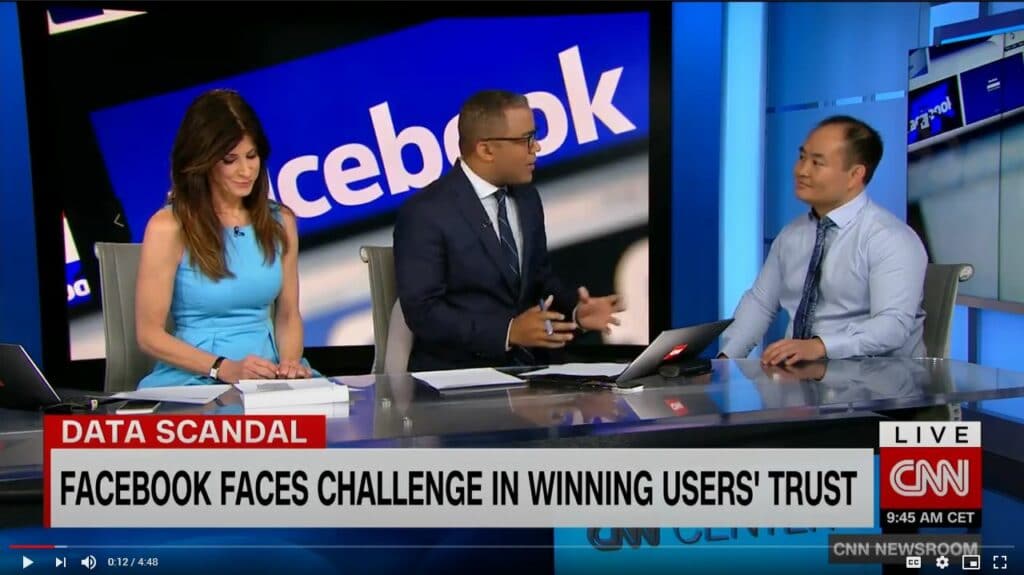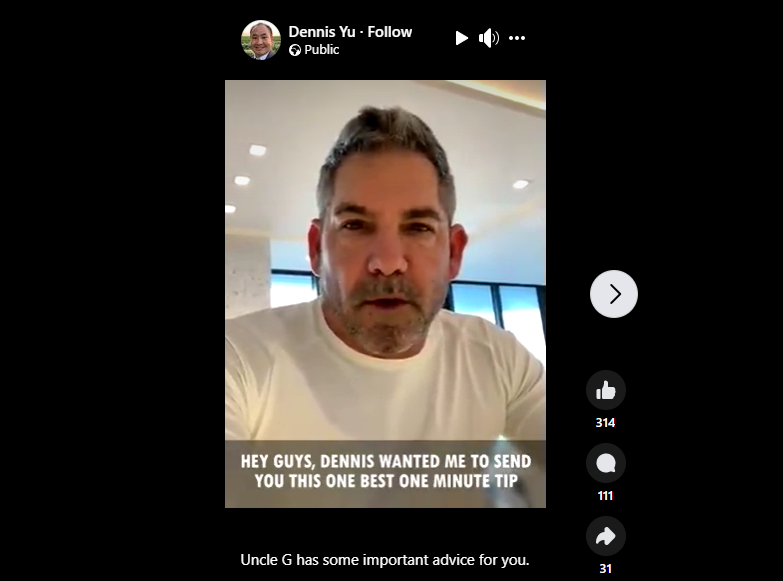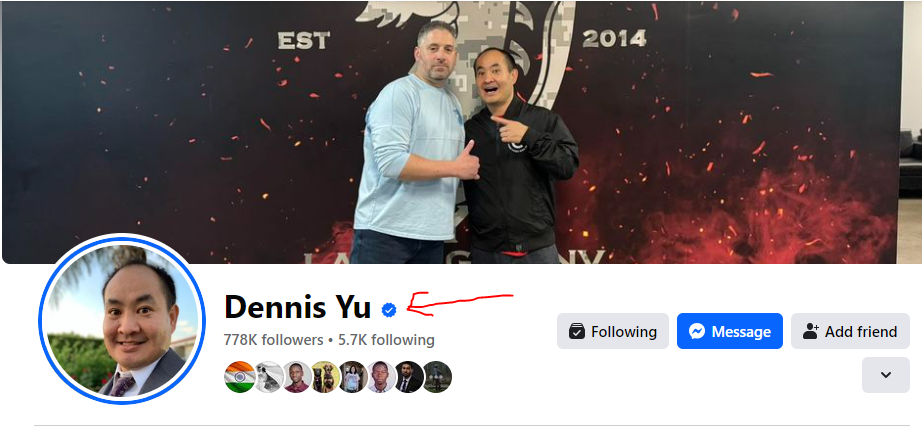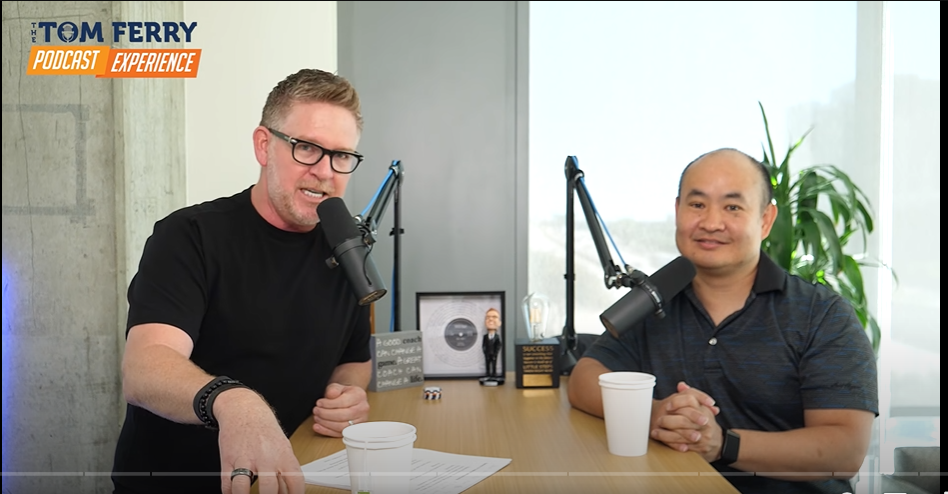
Many of the statements made by search engines are inaccurate, and I can attest to this as a former search engine engineer.
When Facebook advertising came out, I started running ads and speaking about this whole thing. This helped me rank number two in the Facebook advertising search.
The number one result was Facebook itself. So I was ranking number two on one of the most competitive search terms on the internet, doing nothing – no SEO. What I did was speak on TV, share my best knowledge, and write articles, but I haven’t done anything that could be categorized as SEO yet.

All of my friends who are professional athletes, for example, have fantastic knowledge panels, and they’ve done nothing.
Social media affects search engine results.
My former boss at Yahoo became the CEO at LinkedIn, Jeff Wiener, and said that his goal was to rank number one on people’s names. Do you think he has achieved that goal?
LinkedIn is a social network, right? Social network results affect search results. We’ve seen that sites with no inbound links or link authority but have high engagement of traffic will rank on very competitive terms.
Would you not think that traffic driven by social media, whether it comes directly from social media or not, can affect search rankings? Google doesn’t care whether it’s ad-driven or not, as long as it drives actual real engagement.
The Power of Engagement: A Game-Changing Strategy
Our Dollar a Day strategy on Facebook drives 10 percent plus engagement that Google picks up on, which affects search rankings.
10 percent engagement is 10 percent of the people who see that post, like, comment, or share. And you know what the average is on social media or just on the Internet in general for engagement. It’s super low. I think for ads, it’s something like 0.02%. It’s something very low, and Facebook, overall, is probably 1 or 2 percent at best, but we’re looking for a standard of 10%. So, if people are scrolling, and 10 percent of them like, comment, or share, that sends a signal to Facebook that this post is very relevant.
Relevance Score vs. Quality Score: Parallel Paths to Success
And so the relevance score, which Facebook uses, is the same thing as Google’s quality score. They’re almost nearly identical because the quality score and relevance score are the intersections between content and targeting. This is saying that this is interesting enough that people will click on it and continue to watch and engage, not just clickbait them with an interesting headline, but they think it’s interesting enough that they share it with their friends, making it go viral and that kind of thing.
So I would argue that really good content is not just because a marketer thinks it’s amazing, but because the audience believes it is.
Think about this. What is the average CTR if you’re number one? Organically, I think it’s 20 to 25 percent in that range.
So, if you’re ranking number one organically in search results, you’re going to get far more if you’re ranking on your name. If you look at the CTR organic, what are they? That’s north of 20%. So, 10 percent is not that difficult if you are sending content to your audience. Let me give you an example. I’m teaching people how to make one-minute videos. And I’ve got a whole framework, a three-part framework on how to get their attention. Instead of me teaching it, I had my friend Grant Cardone do it.

Grant Cardone is well-known in the world of real estate and beyond. Three years ago, he was the number one influencer on social media, and at least, as he told me, I believed him. So, what I did was to take videos of Grant Cardone and me talking about various topics and targeted fans of Grant Cardone.
So, how relevant is that? It’s super relevant. We have a 40 percent view-through rate, meaning people who saw the video as they were scrolling stopped and watched for at least 15 seconds. This is way higher than the average percentage – getting 40 percent. We often get 10, 20, and 30 percent engagement because the content we create features someone or something well-known, and we target it against what’s already known.
It’s not because I’m clever. It’s not because I have some interesting way of saying something. It’s because I’m super relevant. For instance, if I make a video about five amazing things I learned about knowledge panels from Jason Barnard, then I can target Jason Barnard on Twitter to reach his audience.
I don’t care if you’re brand new. I don’t care if it’s a nobody. I can target any handle. So, if I target that handle with content from that person, thing, place, whatever, it’s going to be super relevant, right? I did this with someone who was a nobody, a friend of mine, Logan Young, just as an experiment, because I love testing things out to prove that it works.
I’ve done this thousands of times, and he had a pit bull. We had a video of a pit bull, and I targeted pit bull owners. What do you think the engagement rate was on that? It was like 14%. It went viral, the media picked up on it, and then he became the featured news story. They brought in a TV crew, and this whole thing was the main feature on KSL, the number one TV radio news station in Utah, with a domain rating of about 90. This drove SEO. So, we drove SEO through social media.
View time is a great precursor to getting shares because if people don’t stick around and watch it, Google can’t see how long people watch on TikTok, but they can get a sense of the reality. And we know that a comment is worth six times more than a like, and a share is worth 13 times more. We did some research to figure that out. So, if we can get a higher proportion of shares, and if you look at your past posts on Facebook or mine or anything that’s gone viral, look at the ratio of shares and comments to likes, and you’re going to find that the most viral videos have a way higher proportion. Sometimes, we’ll see one-to-one, which is crazy. So, it’s not the likes that are pushing it. It’s the shares. Why? Because a share is really like a repost. It’s someone saying, “I like this thing so much, I’m willing to put my own identity behind it.”
And so, absolutely, Google is taking that into account. Comments are somewhere in the middle, but a share tends to be more of an alignment.
I talked with Facebook’s analytics team, and they treat shares as basically a new post. I used to think that a share was like a super comment, but it’s a new post. It just happens to be referencing another post ID.
Strategic Content Creation: A Niche Approach
If your content is good, you don’t need to tell people to share or subscribe. It’s the equivalent of if I told you, “Hey, please tell everyone how handsome I am.” What would you think of me? Tell everyone how smart I am, right? I’m such a genius, right? Tell everyone this, right?
That comes off as promotional like you’re a salesperson. So, yeah, ironically, if you are strategic, meaning the content you’ve made aligns with that audience, and you’re very clear, you’re not trying to be everything to everybody, like the way you are with your consistent branding, you don’t need to tell everybody that you’re knowledgeable about that topic because you’ve niched down to exactly what you want to be known for.
And you have the credibility behind it and you have the credibility from all the other people that are knowledgeable in that area, talking about it, pointing to you, which some people in the world of SEO would say, “Well, that’s a really good backlinking strategy.”
So, Google is looking at who is sharing your content, but it’s not because you have some VA in Pakistan buying links or asking for shares or asking for likes and comments.
The Blurring Lines Between Pages and Profiles
To some degree, I think a Facebook profile is an entity, just like a page is an entity. Some people think that pages have a penalty relative to profiles. I don’t think so. The fact that Facebook recently released the professional profile means you can go to your profile, click on the three dots, and turn it into professional mode.
Now, you can run ads and get analytics. So, it behaves like a page. This just shows that pages and profiles carry the same weight from the Facebook standpoint. I believe no one has proof of this, but I believe that Google treats pages and profiles the same.
The Blue Tick Conundrum: Does Verification Still Matter?
I’d love to hear what you think as of a few months ago, well before having a blue tick, a verified badge helped you as well. I think now it might not. This is me, just guessing. I think now it doesn’t because you can just buy it for $14 a month and you can just buy it on Twitter. But I had it for 15 years on the major networks.

I didn’t pay for it. Now you see my blue check. You might be thinking, “Did Dennis pay for it or not?” Right now, it’s not an advantage that I have over other people. You may say, “Well, if you’re notable, and in all this, then you get the blue tick.” So, is it the chicken or the egg or, you know, causality?
But I would argue that the same thing you would do to earn a legitimate blue tick is the same thing that includes the same steps you talk about for getting a knowledge panel and managing the items and the knowledge graph and that kind of thing.
Then you have, from a brand-set perspective, these social media platforms ranking. Now, what we see is when there is real engagement, they tend to rank on a brand set. Generally speaking, if it’s not ranking on your brand SERP and you’re putting a lot of effort into Facebook, for example, then you’re putting the effort in the wrong places.
Multichannel Approach: Maximizing SEO Impact and SERP
Instead of posting content on Facebook only, cross-post it, and repurpose it, meaning make minor tweaks so it can live on YouTube and Twitter.
If you Google my name, sometimes something that’s on Facebook will just do well. Sometimes, it’s when it’s been repurposed to YouTube. Sometimes, it’s Twitter. I don’t know which; sometimes it’s the actual blog post because we’ll take a video, turn it into a YouTube, and embed that YouTube as part of a blog post. It’s hard for me to tell which one’s going to do better. I think it has something to do with engagement, who’s engaging on it, and where it got shared. And maybe, you know, a colleague of mine emailed his list to go look at the webpage.
Like Tom Ferry, who’s a real estate guy, we did a masterclass on marketing and we put that on a webpage, but there’s also a YouTube and there’s a Facebook and a Twitter, and the webpage of that video is the one that does the best, followed by the YouTube. But maybe that’s because that’s where his audience is, and that’s what Google sees as more authoritative. Who knows, right?

It seems like it’s a toss-up between YouTube and the website, and because my team is so good, we’ve repurposed it to work properly on YouTube. We’ve chopped it up into chapters and added the proper description, with all the necessary setups on the channel.
However, it wasn’t something made individually for the networks. But if you repurpose it by processing it in a certain way, then you can put it everywhere. So, I’m a big fan of taking that content and posting it everywhere. It’s not duplicate content.
It sends a massive signal that this is who you are, this is what you talk about, and this is your network. But it’s not just mass spamming all the networks with the same thing.
Imagine all the guests you have because you can run a dollar a day on YouTube and target particular people.
But imagine all the people you’ve interviewed, or who have interviewed you, or vice versa. Put just a dollar a day targeting that person or that particular topic. I think you’ll get 10 percent.
Facebook Driving Google: A Symbiotic Relationship
Facebook drives Google, and it’s irritating for them to admit that a competitor for attention needs to be shown in the search results.
As a search engine engineer, I would prefer not to show things from another competitor, but they have to because they have to show a mix of where content is being created. If there’s more content being created on social media than on websites, then Google has to show things relative to where the content is and to where people are.
So, we find that if you have a Facebook page or profile, you turn on professional mode and run ads against it. It drives more sharing and more engagement, which the social networks pick up on, and it is a fantastic SEO strategy. First, it allows for content creation because that’s where people naturally create it.
Second, it’s a testing ground because if it works well on social media, it’s going to work on search as well.
Third, it sends massive evidence that this is who you are and who you’re with. It shows your connections in a way that websites never can, showing who you’re connected to and who’s engaging.
Of course, Google can pick up on who’s engaging, and if you run ads against it, even more so. It’s worked super well for me. We drive SEO, not because we sell SEO, but because we do social media, and we boost it to be super relevant.
Want to unlock your SEO potential? Get your comprehensive SEO audit. It’s quick, effective, and essential—let’s go!
